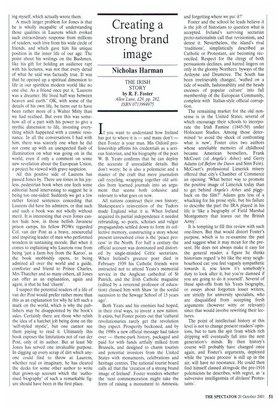Creating a strong brand image
Nicholas Harman
THE IRISH STORY by R. F. Foster Allen Lane, 1'20, pp. 282, ISBN 0713994975 If you want to understand how Ireland has got to where it is — and many don't — then Foster is your man. His Oxford professorship affirms his credentials as a serious historian, and his biography of the poet W. B. Yeats confirms that he can deploy the accurate if unreadable details. But don't worry; he is also a polemicist and a master of the craft that mere journalists call recycling, wrapping together old articles from learned journals into an argument that seems both cohesive and relevant to what goes on now.
All nations construct their own history; Shakespeare's reinvention of the Tudors made England what it is. When Ireland acquired its partial independence it needed rebranding, so poets, scholars and vulgar propagandists settled down to form its collective memory, constructing a story whose present unresolved crisis is the 'peace process' in the North. For half a century the official account was dominated and distorted by single-minded Celtic sectarians. When Ireland's greatest poet died in February 1939 his Catholic friends were instructed not to attend Yeats's memorial service in the Anglican cathedral of St Patrick, and the Irish Catholic magazine (edited by a reverend professor of education) classed him with Shaw in the sordid sucession to the Sewage School of 15 years ago'.
Both Yeats and his enemies had hoped, in their rival ways, to invent a new nation. It exists, but Foster points out that 'cultural revolutionaries rarely get the revolution they expect. Prosperity beckoned, and by the 1990s a new official message had taken over — theme-park history, packaged and paid for with funds artfully milked from Brussels, and designed to charm tourists and potential investors from the United States with monuments, celebrations and heritage centres. The national tourist board calls all that the 'creation of a strong brand image of Ireland'. Foster wonders whether the 'next commemoration might take the form of raising a monument to Amnesia,
and forgetting where we put it?'
Foster and the school he leads believe it is the job of historians to question what is accepted. Ireland's surviving sectarian proto-nationalists call that revisionism, and detest it. Nevertheless, the island's rival 'traditions', simplistically described as Catholic or Protestant, are becoming reconciled. Respect for the clergy of both persuasions declines, and hatred lingers on only in the gloomy Northern byways of the Ardoyne and Drumcree. The South has been irretrievably changed, 'wafted on a tide of wealth, fashionability and the heady excesses of popular culture' into full membership of the European Community, complete with Italian-style official corruption.
The remaining market for the old nonsense is in the United States, several of which encourage their schools to incorporate the Irish Famine (1845-50) under Holocaust Studies. Among those determined `to avoid the shock of confronting what is new', Foster cites two authors whose unreliable memoirs of childhood became American bestsellers, Frank McCourt (of Angela's Ashes) and Gerry Adams (of Before the Dawn and Sinn Fein). McCourt's professional Limerick misery offered that city's Chamber of Commerce an opening: 'What better way to promote the positive image of Limerick today than to get behind Angela's Ashes and piggyback on the film?' Adams gets less of a whacking for his prose style, but his failure to describe the part the IRA played in his life is 'like a biography of Field Marshal Montgomery that leaves out the British Army'.
It is tempting to fill this review with such one-liners. But that would distort Foster's purpose, which is to re-examine the past and suggest what it may mean for the present. He does not always make it easy for the general reader, a figure he thinks historians regard 'a bit like the stray neighbourhood cat: you feel vaguely sympathetic towards it, you know it's somebody's duty to look after it, but you're damned if you are going to do it yourself'. Several of these spin-offs from his Yeats biography, or essays about forgotten lesser writers, are strictly for university specialists, who are disqualified from accepting fresh arguments (however witty or relevant) since that would involve rewriting their lectures.
The point of intellectual history at this level is not to change present readers' opinions, but to turn the spit from which rich dripping will eventually fall into the next generation's minds. By then history's course will probably have changed once again, and Foster's arguments, deployed while the 'peace process' is still up in the air, will have no resonance. He could then find himself classed alongside the pre-1916 polemicists he describes, with regret, as 'a subversive intelligentsia of déclassé Protestants'.


























































































 Previous page
Previous page